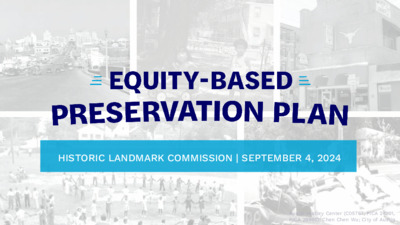27.2 - Equity-Based Preservation Plan - presentation — original pdf
Backup

HISTORIC LANDMARK COMMISSION | SEPTEMBER 4, 2024 Austin History Center (C05767, PICA 24201, PICA 29995); Chen Chen Wu; City of Austin Planning Process HISTORIC LANDMARK COMMISSION Michelle Benavides Mary Jo Galindo*1 Jolene Kiolbassa 1 Debra Murphy 2 Misael Ramos* 1 JuanRaymon Rubio 2 Bob Ward 1 Noel Bridges 1 Jerry Garcia 1 Kevin Koch Robin Orlowski 2 Mary Reed* 1 Maria Solis* 1 Caroline Wright 1 Julia Brookins* Hanna Huang* 1 Kelechi Madubuko 1 Leslie Ornelas 1 Lori Renteria 1 Erin Waelder 1 Amalia Carmona 2 Linda Y. Jackson Brenda Malik Emily Payne Gilbert Rivera 1 Brita Wallace* 1 Ursula A. Carter Meghan King* Alyson McGee 1 Rocio Peña-Martinez* *Drafting Committee member 1 Phase 1 only 2 Phase 2 only Plan Vision Historic preservation in Austin actively engages communities in protecting and sharing important places and stories. Preservation uses the past to create a shared sense of belonging and to shape an equitable, inclusive, sustainable, and economically vital future for all. Joe’s Bakery, anonymous, Amy Moreland/ Austin’s Atlas Plan Goals 107 recommendations 1. Tell Austin’s full history 9. Proactively identify important places 2. Recognize cultural heritage 10. Follow good designation practices 3. Preserve archaeological resources 11. Support stewardship of community 4. Stabilize communities assets 5. Support environmental sustainability 12. Be strategic with review 6. Make preservation more accessible 13. Protect historic resources 7. Support people doing the work 14. Implement the plan collaboratively 8. Engage new partners What We Preserve Images, clockwise from top left: Parade and mural unveiling (The Austin Chronicle), San Antonio Office of Historic Preservation Think broadly. • Recognize Austin’s rich and complex history through active listening, inclusive research, and interpretation • Better recognize and protect legacy businesses, murals, and archaeological resources • Use preservation tools to support displacement prevention and environmental sustainability Who Preserves Invite and support. • Engage new partners and audiences • Help community members access knowledge and resources • Support homeowners and tenants, craftspeople, commissioners, and staff Images, clockwise from top left: Bertha Rendon Delgado, San Antonio Office of Historic Preservation, Austin Asian American Film Festival How We Preserve Be strategic and effective. • Update designation criteria to reflect modern standards • Support the stewards of Austin’s historic properties • Be strategic with review • Improve enforcement processes • Implement the plan collaboratively Community Outreach + Engagement Joe Lung and sons, not dated, Lung House National Register nomination Broad, Inclusive Community Engagement Four-month engagement window from Feb. through May 2024 • 2,500+ people engaged • 29 small-group and 1-on-1 conversations • 49 presentations to boards and • 4 City-hosted events commissions, community groups, and professional stakeholder organizations • 45 pop-ups at community events ❖ 9 paid community ambassadors ❖ 5 mini-grants to community organizations C e n t e r i m a g e s : C r e a t i v e A c t i o n , T A P - A u s t i n LENGTH OF TIME IN AUSTIN Less than 1 year (3%) 6-10 years (12%) More than 20 years (67%) 11-20 years (18%) Who We Heard From Historically Marginalized Communities Survey Respondents (2,083) Austin Communities of color 52% 49.6% People with disabilities 18% ZIP CODES LGBTQIA+ communities 14% Renters 28% 55.6% 7.2% 5.9% More than 5 people responded to the survey in 41 of Austin’s 64 ZIP codes What We Heard COMMUNITY PRIORITIES (AGGREGATED PLAN GOALS) Ensure longtime residents and businesses can afford to stay in their current spaces. Help older neighborhoods and commercial districts maintain their unique look and feel as Austin grows. Represent the diverse communities and complex history of Austin. Encourage environmental sustainability through preservation. Provide opportunities to learn about local history and culture. Improve tools that help historical property owners in an equitable way. Create connections between people by sharing diverse stories. AVERAGE PRIORITY SCORE (out of 100) 86.1% 79.3% 77.5% 77.3% 76.8% 75.6% 73.2% 51% of respondents said we should begin working on this goal first. 20% of respondents said we should begin working on this goal first. How the Plan Responds • 272 community and stakeholder comments on the draft plan • 140 actionable changes suggested • 50 recommendations revised based on community feedback (of 107 in the final plan) • 8 new recommendations added, covering areas such as: • Support for stewards of historic cemeteries • Support for energy efficiency improvements for older and historic properties owners and tenants • Regular building maintenance education and training for property • Identification of and support for heritage tourism sites Preservation Plan Timeline 2021-22 Draft plan developed by Preservation Plan Working Group Fall 2022 Draft plan presented to Historic Landmark Commission Spring 2024 Intensive outreach & engagement Summer 2024 Draft plan revised by Preservation Plan Committee and Working Group CREATE WITH INPUT RAISE AWARENESS GET FEEDBACK ON DRAFT PLAN REVISE + FINALIZE THE PLAN • 4 joint revision meetings Fall 2024 City board + commission briefings Nov. 21 (target) Council review and adoption • Preservation Plan Committee • Community survey • Focus groups • Technical Advisory Group • ULI Technical Assistance Panel YEAR 1 YEAR 2 YEAR 3 YEAR 4 Next Steps High-impact recommendations with existing resources Lay groundwork for larger initiatives High-impact recommendations with additional resources • Public dashboard to track plan progress • Align implementation with related City departments and plans • Continue community engagement and partnership-building • Regular meetings with Preservation Plan Committee www.SpeakUpAustin.org/ATXPresPlan Austin History Center (C05767, PICA 24201, PICA 29995); Chen Chen Wu; City of Austin